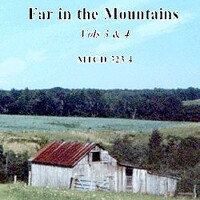With our free press under threat and federal funding for public media gone, your support matters more than ever. Help keep the LAist newsroom strong, become a monthly member or increase your support today during our fall member drive.
From Knee-To-Knee To CD: The Evolution Of Oral Tradition In Mountain Ballads

My 5-year-old nephew, Ezra, sits between his mother and grandmother on a porch-swing covered in old quilts. An expansive view of the Blue Ridge Mountains in Madison County, N.C., spreads out before them.
The porch used to be a really important part of mountain music. Ezra's mother, Melanie, sings one of the old ballads, just like her ancestors used to do 200 years ago.
The hope is that if Ezra hears the ballads, he'll start to learn them, just as he's learned the names of the trees on his farm, says his grandmother Sheila Kay Adams.
"When he was a baby, we used to go all the way to the top of the mountain behind his house where he lives over in Sodom, and we would sing as we were going up the mountain," she says, and then sings, "'Here comes Sally with a snicker and a grin / Groundhog grease all over her chin / Oh, groundhog!"
Adams is a musician and writer. She learned the ballads the old way: by spending time with singers like Inez Chandler.

"When you learned them the way that I did, you had to spend the time with them," Adams says. "There was no other way around it, and that meant more to me — and means more to me now — than the song itself. Anybody can learn a song, but to sit with Inez Chandler for three hours on her front porch, buddy, was an experience."
There are hundreds of ballads that have been passed down from generation to generation. Adams asks her grandson to sing "Jerusalem Mourn," but to Ezra it's "Jerusalem More," because that's the way he understands the song: "Don't you hear Jerusalem more? / Don't you hear Jerusalem more? / Thank God there's a song that's singing in my soul / Don't you hear Jerusalem more?"
The small change Ezra makes to the lyrics is a good example of how songs morph as they're passed down through the oral tradition. The ballads survived 300 years of being passed down solely through the oral tradition. The fact that my 5-year-old nephew is singing a ballad at all is nothing short of a miracle.
Documentary photographer and writer Rob Amberg says there was a moment when the old songs almost died out.
"I think in succeeding generations, as people started listening to more and more radio and then watching more and more TV, the availability of other types of music in people's lives — I think that really changed the whole dynamic," Amberg says.
Amberg filmed and recorded the old singers in the 1970s. It was during the folk revival movement of the '50s and '60s that people like Bob Dylan and Joan Baez recorded their own versions of the songs. The folk revivalists may have saved the oral tradition from oblivion, but by recording everything they also changed the way songs were passed down. That was a problem for my Dad, Joe Penland.
"I heard the statement from one of the younger singers in Madison County say, 'It's not knee-to-knee anymore, it's knee-to-CD,' and that struck me wrong at first," he says. "[But] then when you start thinking about the new technology that we have — any way to learn and preserve our heritage is a good way."

Dad has now recorded two of his own albums of the old ballads. Personally, I'm one of those singers who has learned mostly by CD. I left home almost 15 years ago and will probably never move back. But transmission by CD isn't the only change the ballads have undergone.
"I will say that it was different for me in that Mom heard it from a bunch of old people working in the garden, and I heard it from a bunch of folk revivalists from New York City sleeping on our front porch," says Ezra's mother, Melanie Rice. "It's been a performance-geared situation. I've known Mom being on stage, and I've known big groups of people playing music. It was a big party. It wasn't as much as in the natural setting."
However the ballads are shared, the important thing to Rice is that the they have survived.
"I will always say that in order for anything to survive it must evolve," Rice says. "And in order for the ballads to have survived, they had to evolve in that way so that they could be taken to the greater population and still be getting interest, still be growing, and still be something that was viable enough to be passed down to my son."
As for me, maybe one day, I'll be taking it back to the porch, and Ezra can teach me a ballad sitting knee-to-knee.
Copyright 2024 NPR. To see more, visit https://www.npr.org. 9(MDA1OTI3MjQ5MDEyODUwMTE2MzM1YzNmZA004))
At LAist, we believe in journalism without censorship and the right of a free press to speak truth to those in power. Our hard-hitting watchdog reporting on local government, climate, and the ongoing housing and homelessness crisis is trustworthy, independent and freely accessible to everyone thanks to the support of readers like you.
But the game has changed: Congress voted to eliminate funding for public media across the country. Here at LAist that means a loss of $1.7 million in our budget every year. We want to assure you that despite growing threats to free press and free speech, LAist will remain a voice you know and trust. Speaking frankly, the amount of reader support we receive will help determine how strong of a newsroom we are going forward to cover the important news in our community.
We’re asking you to stand up for independent reporting that will not be silenced. With more individuals like you supporting this public service, we can continue to provide essential coverage for Southern Californians that you can’t find anywhere else. Become a monthly member today to help sustain this mission.
Thank you for your generous support and belief in the value of independent news.

-
Kevin Lacy has an obsession with documenting California’s forgotten and decaying places.
-
Restaurants share resources in the food hall in West Adams as Los Angeles reckons with increasing restaurant closures.
-
It will be the second national day of protest against President Donald Trump.
-
The university says the compact, as the Trump administration called it, could undermine free inquiry and academic excellence.
-
This is the one time you can do this legally!
-
Metro officials said it will be able to announce an opening date “soon.”










